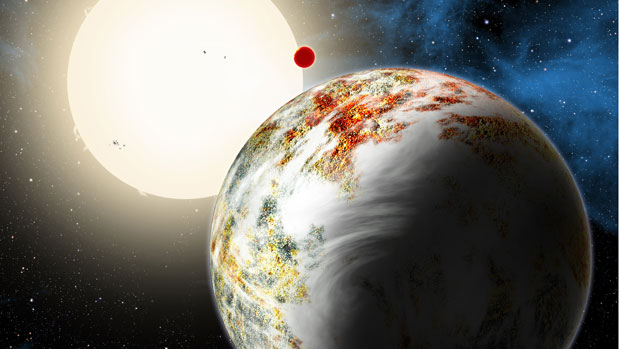'Godzilla of earths': giant planet found by scientists
Discovery of planet 17 times heavier than Earth raises new hope of finding life elsewhere in the universe

A free daily email with the biggest news stories of the day – and the best features from TheWeek.com
You are now subscribed
Your newsletter sign-up was successful
Scientists have discovered a giant rocky planet 560 light-years away, and dubbed it the "Godzilla of earths" due to its large size.
The new-found planet, called Kepler-10c, has surprised researchers, who had previously believed that a planet of its size could not exist without drawing in hydrogen and turning into a gas giant similar to Jupiter or Neptune, according to the BBC.
The planet was first spotted in 2011 by astronomers using Nasa's Kepler Space telescope to scour the skies for Earth-like planets orbiting other stars. It was thought to be a gas giant until researchers took a closer look with the Galileo National Telescope in the Canary Islands.
The Week
Escape your echo chamber. Get the facts behind the news, plus analysis from multiple perspectives.

Sign up for The Week's Free Newsletters
From our morning news briefing to a weekly Good News Newsletter, get the best of The Week delivered directly to your inbox.
From our morning news briefing to a weekly Good News Newsletter, get the best of The Week delivered directly to your inbox.
They then established that Kepler-10c was heavier than first expected, and made of dense rock similar to that found on earth.
Scientists say that the discovery raises the chances that life may have existed elsewhere in the universe.
"The age of [Kepler 10-c's] host star is about 11 billion years old, which is early in the evolution of the universe when generations of exploding stars have not had long to make the heavy elements needed to construct rocky planets," the BBC reports.
"Kepler-10c's properties suggest rocky planets may have formed earlier in cosmic history than many thought possible, and that very old star systems should not be ignored in the search for life beyond earth."
A free daily email with the biggest news stories of the day – and the best features from TheWeek.com
Dr Dimitar Sasselov of the Harvard-Smithsonian Center for Astrophysics could barely conceal his excitement. "This is the Godzilla of earths," he told the Daily Telegraph. "But unlike the movie monster, Kepler-10c has positive implications for life."
"Finding Kepler-10c tells us that rocky planets could form much earlier than we thought. And if you can make rocks, you can make life."
-
 Tourangelle-style pork with prunes recipe
Tourangelle-style pork with prunes recipeThe Week Recommends This traditional, rustic dish is a French classic
-
 The Epstein files: glimpses of a deeply disturbing world
The Epstein files: glimpses of a deeply disturbing worldIn the Spotlight Trove of released documents paint a picture of depravity and privilege in which men hold the cards, and women are powerless or peripheral
-
 Jeff Bezos: cutting the legs off The Washington Post
Jeff Bezos: cutting the legs off The Washington PostIn the Spotlight A stalwart of American journalism is a shadow of itself after swingeing cuts by its billionaire owner
-
 Home Office worker accused of spiking mistress’s drink with abortion drug
Home Office worker accused of spiking mistress’s drink with abortion drugSpeed Read Darren Burke had failed to convince his girlfriend to terminate pregnancy
-
 In hock to Moscow: exploring Germany’s woeful energy policy
In hock to Moscow: exploring Germany’s woeful energy policySpeed Read Don’t expect Berlin to wean itself off Russian gas any time soon
-
 Were Covid restrictions dropped too soon?
Were Covid restrictions dropped too soon?Speed Read ‘Living with Covid’ is already proving problematic – just look at the travel chaos this week
-
 Inclusive Britain: a new strategy for tackling racism in the UK
Inclusive Britain: a new strategy for tackling racism in the UKSpeed Read Government has revealed action plan setting out 74 steps that ministers will take
-
 Sandy Hook families vs. Remington: a small victory over the gunmakers
Sandy Hook families vs. Remington: a small victory over the gunmakersSpeed Read Last week the families settled a lawsuit for $73m against the manufacturer
-
 Farmers vs. walkers: the battle over ‘Britain’s green and pleasant land’
Farmers vs. walkers: the battle over ‘Britain’s green and pleasant land’Speed Read Updated Countryside Code tells farmers: ‘be nice, say hello, share the space’
-
 Motherhood: why are we putting it off?
Motherhood: why are we putting it off?Speed Read Stats show around 50% of women in England and Wales now don’t have children by 30
-
 Anti-Semitism in America: a case of double standards?
Anti-Semitism in America: a case of double standards?Speed Read Officials were strikingly reluctant to link Texas synagogue attack to anti-Semitism